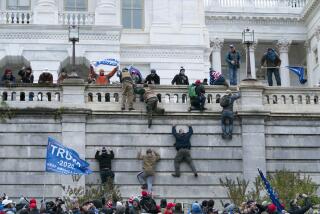Strangling Democracy in Nicaragua : Contra War Will Bring Paranoia and Repression, Not Freedom
The House vote to provide Nicaraguan “freedom fighters” with $100 million in new aid can be regarded legitimately as a flagrant violation of international law, an open declaration of war against Nicaragua and, last but not least, an act of monumental stupidity.
There is little evidence that the 221 House members who voted for the bill bothered to consider its implications. They seemed to have been swayed by President Reagan’s rhetoric, a judicious combination of lies and demagogic appeals to the visceral American fear of the “communist menace.”
None of the charges that have been leveled by the President have any substance: that the Sandinistas have been supplying arms to the Salvadoran guerrillas (no evidence since 1981), or that they have done the same to the insurgents in Brazil (where there are no insurgents), or, above all, that the Nicaraguans have built up their armed strength the better to subvert and eventually invade neighboring countries such as Guatemala and--if only given a chance--distant localities such as the great sovereign state of Texas. (In fact, Nicaragua’s armed forces are preeminently of a defensive kind, and its air force is less than half the size of any of its neighbors’.)
Yet members of the House, haunted by the phantom of a “Soviet beachhead” in Central America, afraid lest they be accused of being “soft on communism” and unwilling to stand up to the chief, swallowed the rhetoric and obediently gave the President what he wanted.
What did they think their vote would accomplish? That the contras , now no longer “covertly” managed by the Central Intelligence Agency, would bring about the downfall of the Sandinista government? Nothing would suggest that they are a match for the large, increasingly well-trained and motivated Nicaraguan army. Furthermore, the contras’ wretched and unabated history of corruption, indiscriminate pillage and murder has made them an object of revulsion even in the eyes of the many Nicaraguans who are hostile to the regime.
Or did the representatives perhaps think that by arming the contras they would strengthen the hand of the democratic opposition inside Nicaragua? Yet what has transpired since the vote indicates that instead of strengthening democracy the U.S. Congress has actually succeeded in eroding it.
Political parties in Nicaragua have been served notice that henceforth any expression of sympathy for the contras will be regarded as an act of treason. According to President Daniel Ortega, the emergency regulations promulgated in October, 1985, and thus far applied “sporadically,” would now be applied “with full vigor.” La Prensa (many of whose editors have made no bones about their enthusiasm for Reagan and the contras) has been closed down “indefinitely.” Bishop Antonio Vega, the vice president of the Nicaraguan Bishops’ Conference and a man who openly has championed the contras, has been escorted unceremoniously across the Honduran border.
These ominous new restrictions were altogether predictable: As a distinguished leader of the Nicaraguan opposition told a representative of Americas Watch last week, “The United States has only its own agenda, it cares nothing about us.” The agenda pays lip service to democracy, but in effect produces the opposite.
Yet another punitive goal of U.S. policy is to force the Sandinistas to end their dependence on Moscow and negotiate with the contras. It is true that the Sandinistas are eager for unconditional negotiations, not with the piper but with the power that pays him and calls the tune--the United States.
However, since the United States seems to prefer war to negotiations, the Sandinistas are left with no choice but to seek additional aid wherever they can get it. And that means, whether we like it or not, the Soviet Union. Indeed, within recent weeks new supplies of heavy Soviet weapons have arrived in Nicaragua. Of course, this may not necessarily increase Managua’s political dependence on Moscow, but we shouldn’t be surprised if it does.
There are those who will say that, whatever the U.S. policies, the Sandinistas were bound sooner or later to become more repressive. Like any other assumption, it stems less from observable evidence than from ideological dogmas (such as the Sandinistas are “Marxist-Leninists” and therefore “totalitarian”). This one, too, can be neither proved nor disproved. What the evidence does suggest, however, is that the Sandinistas, while unwilling to relinquish their power, have tried to work out an accommodation with their internal and external critics, and that their repressive measures, however reprehensible, have invariably been provoked by U.S.-directed aggression.
The Sandinistas have said repeatedly that they will lift the state of emergency as soon as the war comes to an end. Instead, the House passed a bill that prolongs the slaughter and contributes to a state-of-siege mentality that breeds paranoia and repression. If the Senate has any more concern for the prospect of peace and democratic evolution in Central America than the House action demonstrated, it will strike it down.
More to Read
Sign up for Essential California
The most important California stories and recommendations in your inbox every morning.
You may occasionally receive promotional content from the Los Angeles Times.










